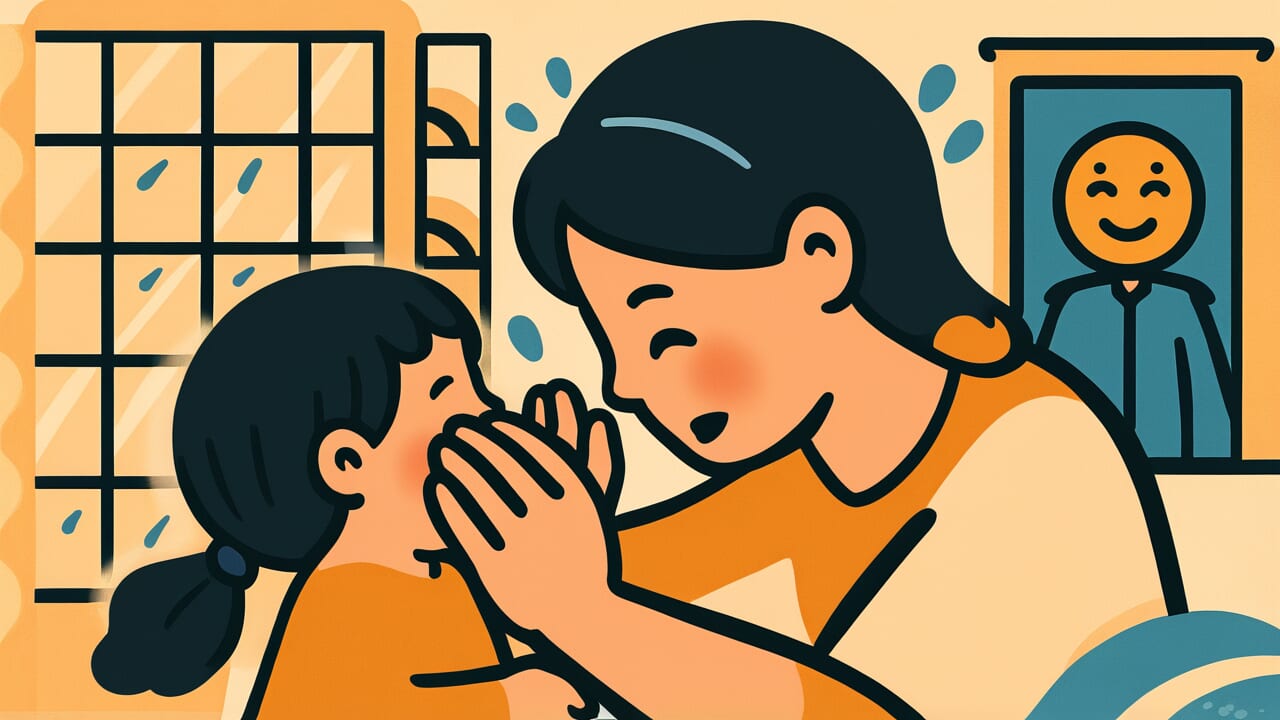How to Read “A child may have too much of his mother’s blessing”
A child may have too much of his mother’s blessing
[uh CHAHYLD may hav too muhch uhv hiz MUHTH-erz BLES-ing]
Meaning of “A child may have too much of his mother’s blessing”
Simply put, this proverb means that too much love and protection from a parent can actually harm a child’s growth.
The saying warns about excessive motherly care. When parents shield their children from every difficulty, they prevent important learning. The word “blessing” here refers to a mother’s natural love and protection. However, even good things can become harmful when taken too far.
This wisdom applies to many modern situations. Overprotective parenting can create adults who struggle with independence. Children who never face challenges may lack problem-solving skills. Parents who solve every problem for their kids often raise unprepared young adults.
The proverb reveals an important truth about human development. Growth requires some struggle and difficulty. When we remove all obstacles from a child’s path, we also remove opportunities for strength building. The saying reminds us that love sometimes means allowing children to face age-appropriate challenges.
Origin and Etymology
The exact origin of this proverb is unknown, though it reflects ancient wisdom about child-rearing. Similar sayings appear in various forms across different cultures and time periods. The concept has been recognized by parents and educators for centuries.
During earlier historical periods, survival often depended on children learning practical skills early. Families understood that overprotection could leave young people unprepared for life’s realities. Communities valued the balance between nurturing and preparing children for independence.
The saying likely spread through oral tradition before appearing in written collections of proverbs. As societies developed more complex family structures, the wisdom remained relevant. The proverb adapted to different contexts while maintaining its core message about balanced parenting.
Interesting Facts
The word “blessing” originally comes from Old English, meaning “to consecrate with blood.” Over time, it evolved to mean any form of divine favor or benefit. In this proverb, “blessing” refers specifically to maternal care and protection.
The phrase uses the possessive “his mother’s” rather than “her mother’s,” reflecting historical language patterns. Many old proverbs used masculine pronouns as the default, even when referring to universal experiences.
Usage Examples
- “My sister never lets her kids do anything alone. I told her, ‘A child may have too much of his mother’s blessing.’ They need to learn independence somehow.”
- “When Jake’s mom still packs his lunch in college, his roommate said, ‘Dude, a child may have too much of his mother’s blessing. You’re twenty years old.'”
Universal Wisdom
This proverb touches on a fundamental tension in human nature between protection and growth. Every parent faces the instinctive drive to shield their offspring from harm. Yet development requires exposure to manageable challenges. This creates an eternal dilemma that has shaped human societies across all cultures and time periods.
The wisdom reveals how our greatest strengths can become our greatest weaknesses. Maternal love represents one of humanity’s most powerful forces. It ensures infant survival and creates emotional bonds necessary for healthy development. However, this same protective instinct can persist beyond its useful period. When love becomes overprotection, it transforms from a survival advantage into a developmental obstacle.
The proverb also illuminates the paradoxical nature of preparation for life. True care sometimes requires allowing temporary discomfort or struggle. Parents who remove every obstacle may believe they are showing love, but they are actually preventing their children from developing essential capabilities. The saying captures this counterintuitive truth that has challenged parents throughout human history. It reminds us that the goal of nurturing is not permanent dependence, but eventual independence. The deepest expression of parental love may be the gradual, careful withdrawal of protection as children develop their own strength and wisdom.
When AI Hears This
Children who never face small problems become helpless with big ones. Like bodies that never fight germs, protected minds stay weak. When parents solve every struggle, kids never build their own strength. The child gets immediate comfort but loses long-term power. This creates a hidden debt that grows over time.
Humans confuse keeping kids safe with making them strong. Parents see tears and rush to fix everything right away. They think protection equals love, but this backfires completely. The instinct to shield children made sense when tigers threatened survival. Now it creates adults who break under normal life stress.
This reveals something beautiful about human complexity and care. Parents sacrifice their child’s future strength for present happiness without realizing it. The same deep love that could build resilience instead creates fragility. It shows how our greatest strength becomes our biggest weakness. Human nature contains this perfect, tragic contradiction at its core.
Lessons for Today
Understanding this wisdom begins with recognizing the difference between nurturing and enabling. Healthy support helps children build confidence and skills. Overprotection creates dependency and fear. The challenge lies in finding the right balance for each child’s developmental stage and individual needs.
In relationships, this wisdom extends beyond parent-child dynamics. Friends, partners, and colleagues can also provide too much help. When we constantly rescue others from consequences, we prevent their growth. Learning to offer support without removing all challenges requires careful judgment. It means being available while allowing others to develop their own problem-solving abilities.
Communities benefit when this principle guides institutions like schools and organizations. Systems that provide appropriate challenges alongside support create stronger, more capable individuals. The goal becomes fostering resilience rather than avoiding all difficulty. This approach acknowledges that struggle, when properly supported, builds character and competence. The wisdom suggests that true blessing comes not from removing all obstacles, but from providing the right balance of support and challenge that allows each person to develop their full potential.



Comments